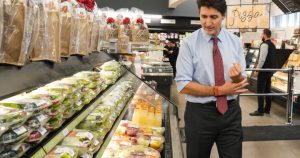Maersk chief predicts intensifying trade tensions after US elections
Unlock the Editor’s Digest for free
Roula Khalaf, Editor of the FT, selects her favourite stories in this weekly newsletter.
Trade tensions will intensify following the US elections amid growing divergence between export flows from China and the US and Europe, according to the chief executive of container shipping group AP Møller-Maersk.
Vincent Clerc told the Financial Times that the world’s second-largest container shipping group had been boosted by strong export growth from China and south-east Asia, leading to the company raising full-year financial guidance for the fourth time this year. But, he said, exports from Europe and North America did “not show the same strength”.
He added: “We’ve seen for a few years an increase in trade tensions, and the root cause is these growing gaps in trade. Our expectation is that we will see more action on trade, and it is something we need to be prepared for.”
Maersk is seen as a bellwether for global trade, transporting one in five containers on the ocean from factories in China to consumers in Europe and the US.
It has benefited this year after freight rates soared from attacks by Houthi rebels against ships travelling through the Red Sea, causing most container vessels to take a far longer route below South Africa.
But investors are worried about the prospect of a full-blown US-China trade war, especially if Donald Trump wins next week’s presidential election. Clerc told the FT in August that some retailers were bringing forward their orders due to the possibility of increasing trade tensions.
Maersk’s operating profit increased more than six-fold in the third quarter from a subdued 2023, hitting $3.3bn. It now expects to make an operating profit this year of $5.2bn to $5.7bn, up from its initial forecast in February of a loss of up to $5bn. Most of the rise in container demand this year was due to increased exports from China and south-east Asia, it added.
Clerc said Maersk was closely watching the trade “imbalance” between China and the west and spending “a lot of money” moving containers to where they were most needed. “You can wonder how sustainable a growing gap between imports and exports is,” he added.
But he stressed that at the business level, Maersk was more dependent on consumer sentiment, which was much stronger in the US than in Europe.
Asked about the prospects of increased trade tariffs if Trump won, Clerc responded: “What decides how many container move is not tariffs, but how much consumers are spending.”
He added that there would be “different ways of trade adapting to new circumstances” such as moving production to other countries or renewed inflation. “The strength of the US economy is there, and shows no sign of weakening,” he said.
Container shipping boomed after the first phase of the Covid-19 pandemic but suffered a sharp downturn last year. Maersk initially thought that would continue into this year as a large number of new vessels ordered during the bull market were delivered.
But Clerc said Maersk had been surprised by the “strong market demand” and the “high amount of black swan events” such as the Red Sea attacks and the pandemic.
Revenues in the third quarter rose 30 per cent to $15.8bn while net profit more than quintupled to $3.1bn.
Shares in Maersk were up 1.5 per cent to DKr10,160 in late-morning trading on Thursday, but are less than half of their 2022 peak level.
#Maersk #chief #predicts #intensifying #trade #tensions #elections





